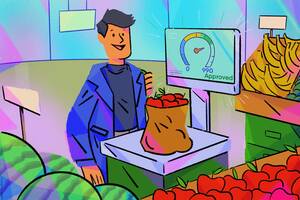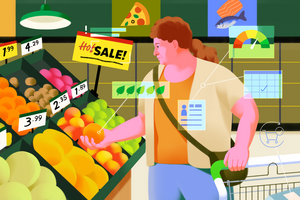An estimated 50 million Americans have gone on a diet this year. Taking control of their diet and eating right—keeping portions small, stocking up on fruits and vegetables, declining dessert—ought to make people feel great. But as many dieters—and their dinner companions—can attest, sticking to carrots when they would much prefer carrot cake makes some people extremely grumpy.
That mismatch—getting irritated by one’s own self-control—stuck out to David Gal, an assistant professor of marketing at the Kellogg School of Management. “You’re restricting yourself, and that seems to be a natural antecedent to anger,” he says. “I started wondering: Do people have not just positive effects from self-control, but negative effects, too?”
Earlier studies had found that self-control can make people aggressive. Researchers attributed the effect to something called ego depletion: people essentially use up their self-control doing one thing—say, opting for a side salad over fries—and they are simply not able to regulate themselves as well right afterward. It was not anger itself that was the outcome, these researchers suggested, but a general difficulty keeping any undesirable behavior in check.
A Trip to the Movies
But Gal and Wendy Liu, an assistant professor at the University of California, San Diego, suspected that self-control might result in anger more broadly. Maybe it is not just that we are worn out from being good, they hypothesized, but that holding ourselves back actually irks us. They tested that idea with a set of four studies.
In the first study, undergraduates could choose between two snacks as a sort of thank-you gift for participating in the experiment: an apple—the healthy choice, or a chocolate bar—the tempting but unhealthy choice. Choosing the apple over the chocolate would, for many people, require a good dollop of self-control.
Self-control first meant an inclination toward anger later, even when the anger was completely appropriate and did not have to be regulated.
Then, in what they were told was an unrelated task, the students could pick which of a pair of movies they wanted to watch. The movies were similar to each other—the same genre, the same style, the same actors, or some combination—except that one movie was anger-themed while the other was not. (Sample movie pairs included Anger Management or Billy Madison, and Hamlet or Romeo and Juliet.) To account for the possibility that people who prefer apples to chocolate also happen to like anger-themed films, another set of students picked what to watch before they chose between the food options.
Gal and Liu found, as they expected, that people who selected an apple before deciding what movie to watch were more likely to opt for anger-themed entertainment than people who picked the apple afterward. For people who chose chocolate, however, the link disappeared; people who selected their snack before or after seeing the movie options were equally likely to select an anger-themed film. Self-control first meant an inclination toward anger later, even when the anger was completely appropriate and did not have to be regulated; Anger Management is just as socially acceptable as Billy Madison.
It is important to note that the students were not throwing temper tantrums after choosing the apple. “People didn’t say they were angrier, but it was manifested in these behaviors afterwards,” Gal says. “People think they’re good, so they’re not going to report they’re angry.” Instead, the anger shows through more subtly.
A Consistent Pattern
Gal and Liu then tested whether self-control led to anger in another situation: when someone bosses you around. In this study, students still chose between an apple and a chocolate bar. Instead of picking movies, however, they read a passage exhorting them to exercise that was packed with what scientists call controlling language: “must,” “need to,” “ought,” and “should.” After reading the message, the students ranked how irritated they were with it.
The same pattern emerged as when people picked movies: Students who chose the apple before reading the passage found it more irritating than students who chose the apple afterward. Students who picked the chocolate, however, felt the same about the message irrespective of when they selected their snack. The act of keeping a sweet tooth in check made the students more irritable.
The researchers also investigated whether self-control was associated with other negative emotions or whether the effect was specific to anger. Using a set-up similar to that of the previous studies Gal and Liu again gave students a choice of reward. Students could enter a raffle for one of two financial rewards rather than two snacks: a grocery store gift certificate—the fiscally responsible choice, or a spa certificate—the less responsible but more luxurious option. The students also looked at photos of six faces, three with angry expressions and three with fearful expressions, and were asked to rank how interested they were in each face.
Exercising self-control—picking the groceries rather than the spa—before looking at the photos made people more interested in the angry faces, but not the fearful ones, than people who picked the groceries after seeing the faces. People who picked the spa certificate had the same response to the faces whether they chose to enter the lottery before or after looking at the photos. Self-control does not simply spur negative emotions, the results suggest, but leads to anger in particular.
To further test that idea in their final study, Gal and Liu looked at whether self-control might trigger sadness, another negative emotion. In the same study, they wanted to further suss out whether self-control in choosing the apple—and purposefully turning down the chocolate—was what caused the effect, rather than something else about selecting the fruit. To do this, the researchers evaluated whether students were restrained eaters—meaning they felt a conflict between what they should eat and what they wanted to eat—and unrestrained eaters, who simply eat what they would like.
As in the previous studies, the students (all women, this time, since women are more likely to be restrained eaters) chose between an apple and a chocolate bar, and did another task either before or after. In this case, the students read six appeals for good causes, written in a way that evoked either sadness or anger, and were asked to rate how much they agreed with each appeal. After both picking a snack and rating the appeals, the students filled out a questionnaire that measured to what extent they were restrained eaters.
As in the earlier studies, self-control impacted anger, but not sadness. The students were anger-oriented, viewing the angry appeals more favorably, if they had chosen an apple first—but only if they were restrained eaters. Unrestrained eaters, regardless of what they chose, were like restrained eaters who chose the chocolate bar: the timing of when they chose a food did not affect their emotions.
“Restrained eaters tend to interpret choices as an act of self-control, by thinking of everything as a conflict between what they want to do and what they have to do,” Gal says. But as the unrestrained eaters show, “it doesn’t have to be that choosing healthy options makes you angry. It’s just a matter of how you interpret it.”
Getting at the Source
Because these studies showed that self-control led to anger even when anger was not inappropriate, Gal says, it is unlikely that the old theoretical explanation—exhaustion from self-control leads to less self-regulation—fully accounts for the results. He and Liu have suggested several other potential mechanisms that link self-control to anger more generally, which they plan to investigate in future studies.
One possible mechanism, Gal says, is that the anger stems from wanting what we cannot—or rather, know we should not—have. When exercising self-control, people have to turn down immediate gratification; when something comes between a person and a reward, research has shown, anger is a frequent result. Another possibility is that people feel a lack of autonomy when exerting self-control—that they have to do one thing over another.
“How you construe a situation might affect your resulting emotions from it,” Gal says. “For example, it might be that if you construe a choice as one you have to—but don’t want to—make, you’ll be angrier. But if you construe the situation as a free choice, if you make it seem like something you want to do instead of you have to do, you tend to actually feel good about your choice.”
Understanding the negative effects of self-control, as well as the positive, could help inform how policymakers and individuals approach weight-loss efforts. “From a policy perspective, our study raises interesting questions, along with other research that shows there are a lot of negative consequences to dieting,” Gal says. “Almost all diets are very restrictive, by their nature. I think our results add to this notion that that kind of approach to eating isn’t healthy.”
Related reading on Kellogg Insight
A Dieting Conundrum: Why dieters underestimate calorie counts of meals
Real Men Don’t Eat Very Berry Cheesecake: Manly preferences take their toll
Beware the Siren’s Song: Maintain self-control by avoiding temptation
Gal, David and Wendy Liu. 2011. “Grapes of Wrath: The Angry Effects of Exerting Self Control.” Journal of Consumer Research, 38(3): 445-458.


